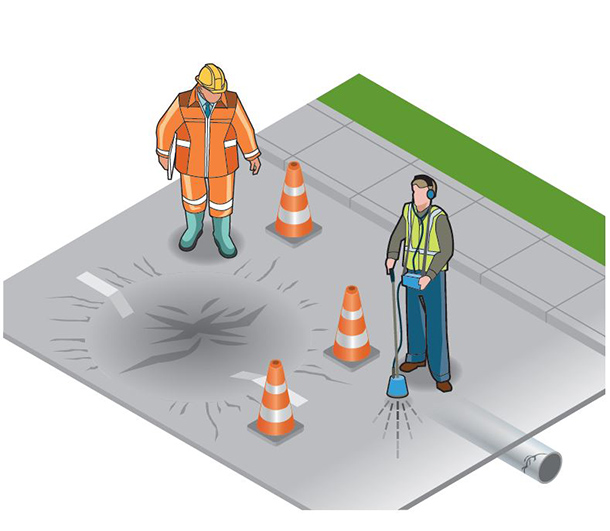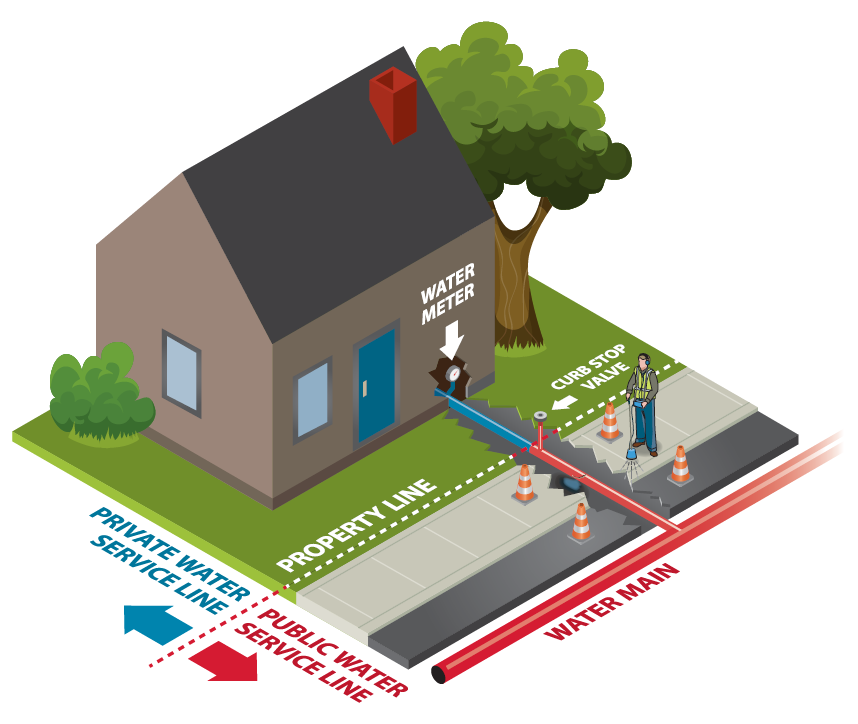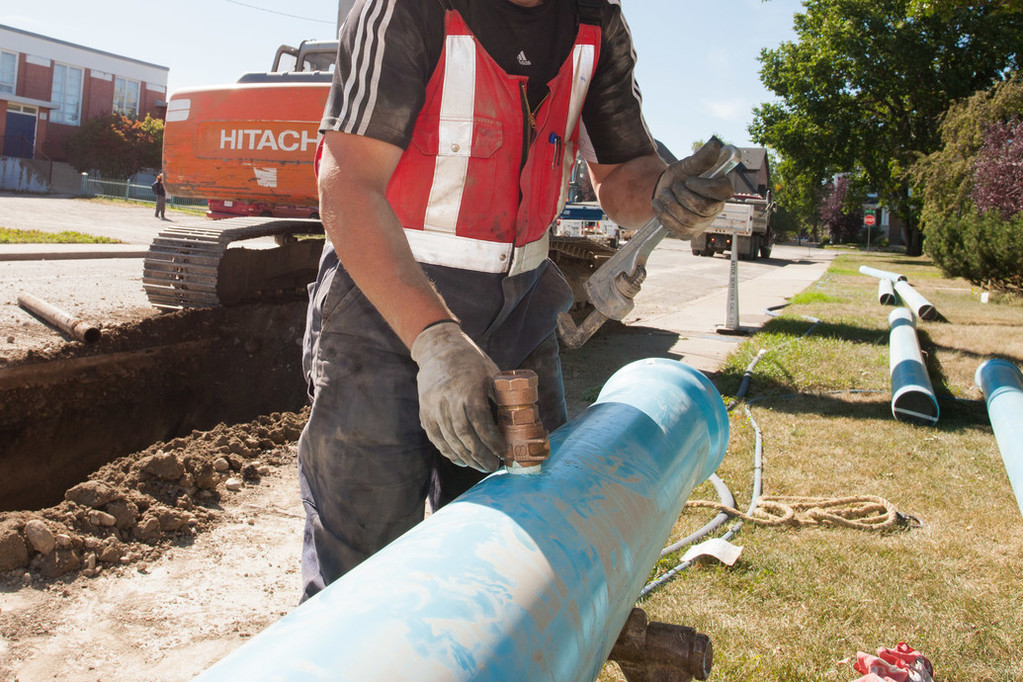Water service line leaks in Calgary
What if I suspect there is a leak on my property?
The following signs may show that there is a leak on the water service line between your water meter and The City service valve.
- Noise on the water service while none of the taps are running
- A drop in water pressure
- Water flowing or pooling on the ground surface
If you suspect a leak outside your home, please call 311.
Homeowner Water Guides for water service line leaks
English
More languages:
How does The City check for leaks?
There are two ways The City checks for leaks:
- Through 311 from citizens suspecting leaks and water main breaks. Leak locators are then dispatched.
- City Planned Survey: When leak locators are not attending emergency main breaks, they perform scheduled routine leak detection surveys in assigned communities to proactively locate potential water leaks.
If a leak is suspected to be on the private property side of the water service, the leak locator will contact the homeowner to obtain access to the water meter or main shut-off valve inside the house or building to perform further tests.

What happens if my water service line is leaking?
If there is a leak in your water service, you are responsible for:
- Arranging for a water contractor to make any necessary repairs
- Paying for the repairs
Per the Water Utility Bylaw, the owner is responsible to 'maintain such Water Service Connections in a state of good repair, with sufficient protection from freezing, free form leakage, or other water loss.' The City requires repairs to be made within 15 days or a remedial order may be issued.
To learn more about water line responsibilities, visit Water Service Lines in Calgary.

How is a water service leak repaired?
There are a few methods used to repair a water service:
- Service pull: Trenchless procedure that pulls a replacement water service from the house to the service valve with minimal digging.
- Excavating: Trench excavation from The City’s service valve to the house.
- Spot repair: Using the hydrovac procedure (pressurized water and vacuum system to expose underground pipes) allows for repairs at the leak location.

How much does a water service repair cost?
The cost of a repair can be highly variable, depending on the contractor and type of water service repair. Unfortunately these repairs aren’t typically covered by a basic homeowner’s insurance policy.
To reduce the financial impact of unplanned repairs, you may wish to explore additional insurance options. Talk to your current home insurance provider.
What can happen if a leak isn't addressed?
Your water service is connected to the water mains that carry water from the water treatment plant to your home. Because the water system is pressurized, when a hole or crack occurs in the water service, water will continue to flow until The City turns off your water service valve(s).
Failure to address a leak may cause damage to your property, the street and sidewalks. Repairs must be made as soon as possible. Water usually finds its way to the surface, but depending on the soil type (e.g. gravel, sandy soil), water may not surface immediately.
Instead, the water may do the following:
- Saturate soil and seep into your basement or your neighbours' basement.
- Cause sump pumps to operate unnecessarily.
- Cause damage to the foundation of your house or business.
What should I know about hiring a contractor?
Changes to open excavation policy
While completing repairs on the public side of the service line, we may uncover issues effecting the private side. In the past, we have left the excavation and trench cage in place after completing work on public property, allowing licensed contractors hired by the homeowner to use the same area for private-side repairs.
Occupational Health and Safety (OHS) has determined this practice is no longer compliant with current safety standards. As a result, The City can no longer leave open excavations or trench cages on-site for private contractor use.
What does this mean for property owners?
When a private-side issue is identified, homeowners are responsible for hiring a licensed contractor to complete any necessary repairs. In addition to the repairs, the contractor will need to excavate a new trench, which may increase total cost.
We recognize that this change may be frustrating, especially in areas where residents have previously seen shared trench use. However, these updates are required to comply with OHS safety standards and ensure worker protection.
As a reminder, The City requires such repairs to be made within 15 days, as outlined in the Water Utility Bylaw (40M2006), as the property owner is responsible to maintain their private water service line to ensure it does not freeze or leak.
When hiring a contractor, The City suggests that you:
- Get at least three estimates.
- Ask for and check contractor references.
- Contact the Better Business Bureau, or a similar agency, for a reliability report on the contractors.
Your contractor will be responsible for:
- Obtaining the necessary permits.
- Getting clearances from utility companies (e.g. Utility Safety Partners).
- Repairing the leak.
The City of Calgary is responsible for:
- Turning off water service to the house or business, so the repair can be made.
- Fees are applicable to turn the water service off and on.
What else should I know?
- We many have to turn off the water at any time after the leak is discovered if the leak becomes a risk to our water supply, public safety, private or public property.
- While your water is off during the repair, we recommend that you keep your taps closed to prevent flooding when your water is turned back on and turn off hot water tanks to prevent damage.
- Options for temporary water: If weather permits (temperatures above zero degrees), you may have the option to install a temporary water line from your neighbour’s water plumbing, if they agree to this. Information will be provided to you if this option is available.
- Once the repair is complete, we recommend that you do the following:
- Book a service call to have your main water service valve on the property line turned on. Visit Water Interruptions and Disconnections for special instructions and applicable fees.
- A person 18 years or older must be present at the home or building to have your water service turned on.
- Wash tap aerators and screens in hot soapy water, then disinfect them for 10 minutes in a solution of one part bleach to nine parts water.
- Disinfect any water filters to the manufacturer’s recommendations.
- If you have any questions, please call 311.


